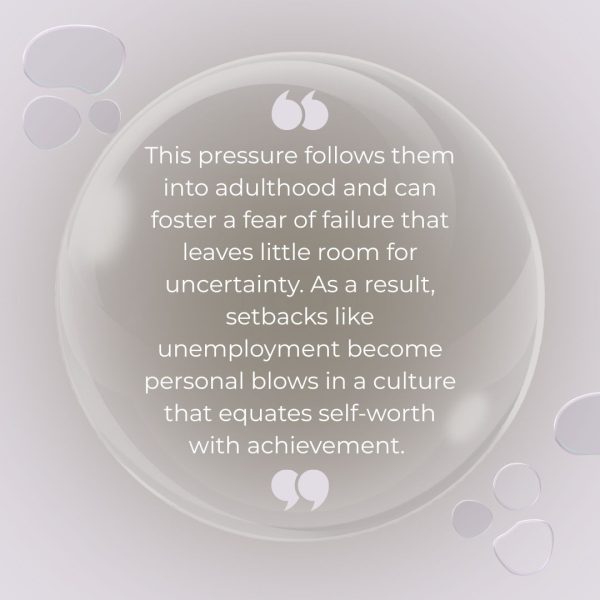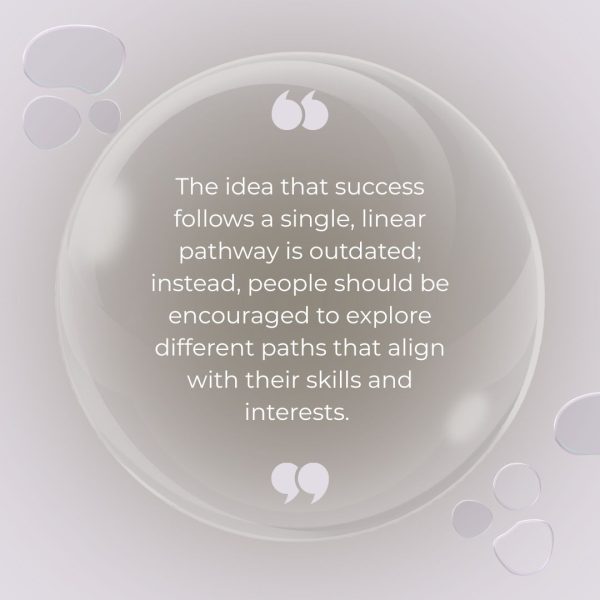As the home of Apple Inc. and many tech professionals such as Steve Jobs and Ronald Wayne, co-founders of Apple, Cupertino has built a reputation for technological innovation, high salaries and work-driven lifestyles. Billboards along highways advertise the latest AI breakthroughs while students juggle AP classes and intensive internships, striving for their place in the competitive Silicon Valley industries. Ambitious parents map out their children’s futures, ensuring they are on the path to “success.” In a city where housing costs 451% higher than the national average and the median household income is $206,219, the pressure to succeed is immense.
But behind the sleek office buildings and six-figure salaries lies an unspoken reality: the stigma of unemployment. Here, losing a job isn’t just an economic setback — it carries a heavy social burden and can feel like an identity crisis. Many residents tie their self-worth to their professional success, making job loss feel like a personal failure. However, when employees in the U.S. change jobs every 4.2 years, it is normal for those searching for a new job to experience a period of unemployment.
Despite this, the mindset of success and nothing less is reinforced from an early age, particularly at MVHS, where academic excellence is the norm. Students grow up with high expectations, being pushed to strive for prestigious colleges and “successful” high-paying careers. There have been too many occurrences of students being forced into majors parents deem “successful,” such as computer science, which has become all too common for MV students. Success becomes the standard, and anything other than meeting and fulfilling those ideals can feel like failure. This pressure follows them into adulthood and can foster a fear of failure that leaves little room for uncertainty. As a result, setbacks like unemployment become personal blows in a culture that equates self-worth with achievement.

In Cupertino, as in many high-achieving environments, unemployment is rarely discussed openly. The lack of open discussion around unemployment contributes to the stigma, creating an environment where individuals hesitate to seek support. The effects of this silence are evident. Many people without jobs feel they must put on a facade of productivity, even if it comes at the expense of their mental well-being. A survey by the Pew Research Center found that 38% of long-term unemployed individuals reported losing some self-respect, and 24% sought professional help for depression or other emotional issues while out of work.
Some argue that this stigma serves as motivation, pushing individuals to work harder to secure employment. However, fear is not the same as motivation. The reality is that many job losses are out of an individual’s control, especially in an era where company layoffs and economic shifts frequently impact employment. Different fields also face varying unemployment rates, with the technology field being one of the most unstable. In 2024 alone, Silicon Valley saw over 2,000 tech layoffs, showing that even in an area filled with opportunity, job security is never guaranteed.
This paranoia of unemployment also comes from the pressure to maintain a certain lifestyle. The fear of losing financial stability can be overwhelming, pushing individuals to constantly hustle and work beyond their limits. It’s not just the uncertainty of falling behind but of losing one’s place in a competitive, success-driven culture. Addressing this issue is critical, as individuals will feel heard and acknowledged. By receiving a support system and acceptance in their communities, they understand that job loss doesn’t reflect their worth or identity.
Like many areas shaped by Silicon Valley, career success in Cupertino is often viewed through a narrow, linear lens: attend college, secure an internship, land a prestigious job and climb the corporate ladder. Yet, this rigid view fails to account for the many individuals who have found success by veering off this conventional track. For example, Zachary Hsieh, more commonly known as ZHC online, is an MV alum who pursued a path of art and now has millions of followers on his social media platforms. The idea that success follows a single, linear pathway is outdated; instead, people should be encouraged to explore different paths that align with their skills and interests. Recognizing this reality could help destigmatize career shifts and promote a culture that values growth over rigid definitions of success.

We also need to stop glorifying a single definition of achievement and instead prepare for the real world, where failures and detours are just as valuable as accomplishments. MVHS and other schools have an opportunity to play a role in this shift by incorporating career counseling workshops with experienced speakers that normalize job loss and career pivots. Additionally, annual alumni panels featuring graduates who have taken non-traditional routes to employment could provide valuable perspectives to current students, showing that success does not always come from structured pathways. Local organizations and networking groups could host workshops that provide career support and mentorship for job seekers. Public awareness campaigns and community forums could help break down misconceptions about job loss and employment gaps, encouraging a more compassionate outlook.
Ultimately, we need to change our perspective on unemployment. Cupertino can set a powerful example by reimagining how career paths are valued, not solely based on linear progression or immediate achievements but on the ability to adapt, learn and evolve. This way, we can create a culture where individuals feel empowered to seek help and navigate career transitions without fear of judgment. Only by breaking the silence around unemployment and shifting from shame to support can Cupertino truly cultivate an environment where resilience is valued.












